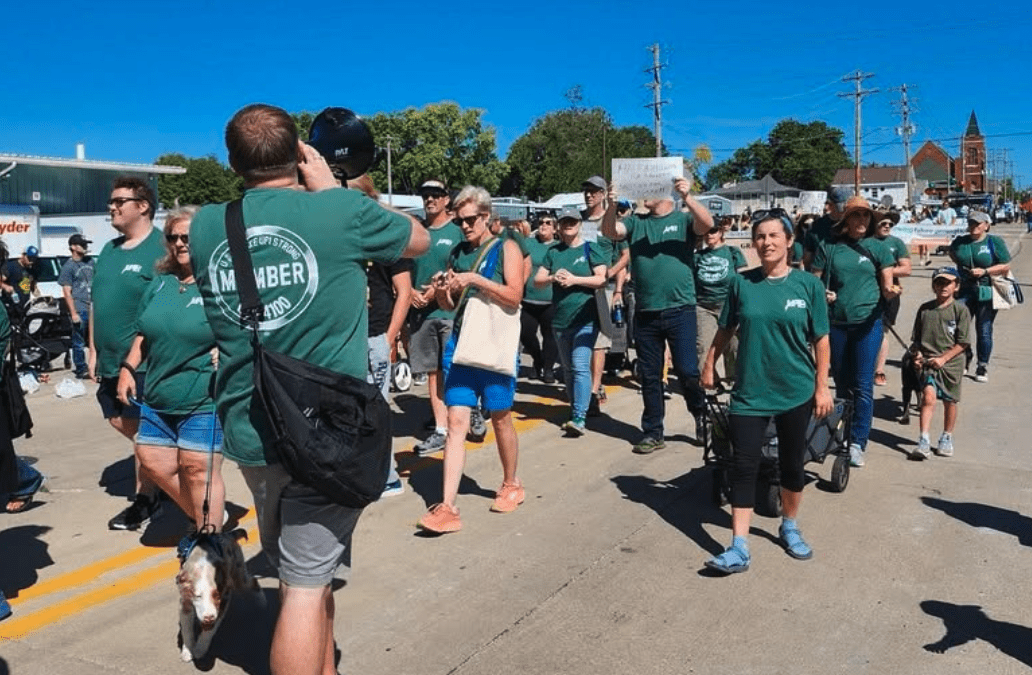
Delta plane and Air Force jet ordered to maneuver to avoid collision near DCA airport
March 29, 2025
Breaking Bad: How MAGA Turned a Gen Z Influencer Against the “Elites” (w/ Natalie Winters)
March 29, 2025I signed my first union card my first week of graduate school. It was August 2013, and I was about to start the PhD program in history at Yale. When I joined the Graduate Employees and Students Organization (GESO) (now Local 33–UNITE HERE), graduate workers had been organizing at Yale for nearly three decades. Over that time, we won real improvements in working conditions for graduate students because of funding, solidarity, and support from the other unions on campus, who believed in us even when we didn’t believe in ourselves.
Yale was not alone. Unions have invested over the last several decades in graduate worker organizing across higher education, first at public universities and more recently at private institutions like Yale — even though federal law until 2016 said that private-sector graduate workers weren’t really workers. With that support, graduate workers launched a tidal wave of organizing. And despite a roller coaster of ups and downs in our legal ability to organize, Yale graduate workers won their first contract in 2023, a contract that made graduate work livable.
Higher education has been under attack for decades, as states have cut funding and universities have turned into crushingly expensive credential factories. More recent conservative attacks on higher education have intensified existing problems — but this was already an existential crisis. What that crisis looks like for academics is a fifty-year shift away from secure tenure-track jobs (with protections for academic freedom) and toward tenuous gig-style adjunct labor, particularly though not only at ill-funded public institutions.
Most people who start PhD programs will not get tenure-track jobs. Instead, after six or seven years with bad health care, nonexistent childcare, and a limited ability to save money, they’ll transition into an even more precarious existence — short-term research fellowships, teaching single intro-level classes at multiple universities, the omnipresent possibility of last-minute employment changes by universities — but always with the unlikely but not impossible promise of a tenure-track job dangled in front of them.
I finished my PhD in May 2020. I was “on the market” for four years. In that time, I applied to seventy-one jobs, and close to that many fellowships and temporary positions. I had twenty-seven first-round interviews and eight second-round “campus visits” before I got a tenure-track job offer. I was lucky. I had a three-year fellowship that filled the gap between PhD and the tenure track. But for many, the prestigious fellowship becomes just another badly paid temp gig that prolongs the inevitable. It turns out that getting a PhD, or a good postdoc, is no guarantee of a cushy ivory-tower life of the mind or of middle-class stability. For most of us, getting on the tenure track doesn’t mean an end to precarity.
If you read the New York Times, it might seem like the crisis of higher ed is primarily a crisis of elite private institutions. Hyper focus on the Ivy League, whether in the news or in government, isn’t new. But the real crises — and the real opportunities for change — are in the public sector. For public universities, especially universities that aren’t “flagships” for their state systems, funding crises aren’t new or surprising. They’re the norm. And that has pushed faculty, including tenure-track faculty, to organize.
I signed my third union card my first week on the tenure track. It was August 2023, and I was starting my job at Illinois State University (ISU). Like many of my colleagues, I am overworked and underpaid. My employer has no real family leave policy, and administrators have pushed faculty over the years to produce levels of research as if we were at Harvard or Yale without meaningful financial support or teaching relief. We need a union to make our work livable and sustainable.
My union, United Faculty of ISU (UFISU), started organizing with the American Federation of Teachers early in 2021. Galvanized by frustration with the administration’s inadequate response to COVID-19 and the imposition of seemingly arbitrary rules for emerging from remote work, a group of faculty started to talk about what else was wrong with the university. By that point, “austerity budgeting” was a decade-old norm. Salary increases were few, far between, and regularly based only on “merit,” which meant cutthroat competition among colleagues. And while administrators used the threat of an impending “enrollment cliff” to justify cuts, faculty watched ISU’s freshman enrollment increase almost every single year.
Before UFISU launched, many members met and began building relationships, trust, and organizing muscle in a solidarity group with other campus unions, including the grad workers and non-tenure-track faculty. Statewide, we’re a chapter of University Professionals of Illinois (UPI) Local 4100, which includes tenure-track, non-tenure-track, and staff chapters across eight state university campuses.
Over the course of the 2010s and 2020s, UPI launched successful organizing campaigns across the state at Northern Illinois University, ISU, and, most recently, non-tenure-track faculty at University of Illinois, Springfield. In 2022, many UPI chapters coordinated their bargaining, and three of our sibling chapters — Chicago State University, Governors State University, and Eastern Illinois University — went out on strike and won good contracts.
Public education should be a right. It is the vital, beating heart of a democratic society. Many of my students plan to be high school social studies teachers. I teach them about capitalism, empire, and resistance before they go out and bring those ideas to their own students around Illinois and beyond. My students are curious and principled. They are hungry to learn and think, and I (mostly) love being in the classroom with them.
But my students are also overworked. Many of them are working minimum wage service jobs on top of their schoolwork. Many of them face substantial pressure to choose “useful” majors — college is unjustifiably expensive otherwise. Those pressures are most acute at public universities, where the vast majority of Americans who earn college degrees get their education. My students are being shortchanged by the institution as much as me and my colleagues.
That’s why we’ve adopted the “bargaining for the common good” model pioneered in the Chicago Teachers Union’s 2012 strike and further developed by Rutgers University AAUP-AFT for higher ed. As organized workers, we can and should fight not just for ourselves but shoulder to shoulder with our communities.
There’s a part of me that wishes this weren’t necessary — that I could just do my job and then go home and play with my cat, make dinner, watch mindless TV. But a larger part of me is glad that I ended up in a place where people are struggling, where I can struggle alongside them, where I can build and wield power. Even when it took more time and mental energy than I wanted to give it, organizing and being part of a union is what taught me that I matter.
People often ask me how I came to study histories of capitalism in late Ottoman Iraq. My potted answer is about growing up in the shadow of the 2003 invasion of Iraq and the 2008 financial crisis. This is true. But organizing also transformed how I think about the relationship between material life and political life. I don’t work on unions. I don’t even work on labor or the working class — I study wealthy elites. Even so, organizing was what led me to think more deeply and in new ways about capitalism and power. It made it impossible for me not to think about those things.
When we act collectively, we remake ourselves. Nobody is born brave. We do not know, automatically, how to be in community and struggle together. We learn courage through collective action and struggle.
I see organizing as both pragmatic and transformative. Our contract will make living and working at ISU more sustainable and more human. But also, organizing together changes our sense of what is possible. How will we learn to have power in the world if we cannot build it locally, in our workplaces? How will we learn to have solidarity across difference, and to value others in and for themselves, if we cannot do it locally, with people we know?
What is happening here at ISU and other universities needs to be happening everywhere. In many ways, higher education is broken. Conservatives want to break it even further. Most of us in the academic workforce are not at elite institutions. And even if you are, hunkering down won’t change anything. But organizing and solidarity can.
Illinois State is different from Yale. But in some important ways, it’s also the same. ISU’s university administration and their lawyer have dragged out negotiations for as long as they possibly can. We have been bargaining our first contract for over a year now. That means a year with no raises. A year with no more resources for student mental health. A year in which some people got pregnant and had their kids without any change to the parental leave policy. It’s enough.
Great Job Camille Cole & the Team @ Jacobin Source link for sharing this story.






